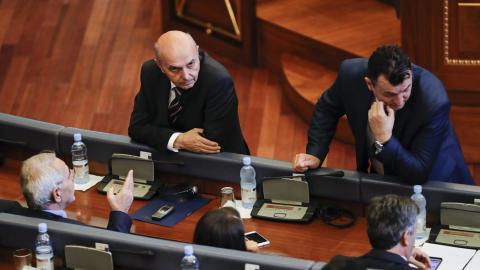Kosovo’s Oldest Party Needs Reality Check After Election Rout

Chronicle of a defeat foretold
Workers place a giant electoral poster showing candidate for prime minister of the Democratic League of Kosovo (LDK) Avdullah Hoti in Pristina, Kosovo, February 4, 2021. Photo: EPA-EFE/VALDRIN XHEMAJ
"The preliminary results are totally different from what I expected," Hoti said in the evening of February 14, by when his defeat was confirmed. "I take full responsibility for this election result," he added.
The ground began to shake beneath the LDK in March 2020 when, in the midst of the COVID pandemic, it made the unpopular decision to table a no-confidence motion in the government led by Vetevendosje's Albin Kurti - its own coalition partner - after only 51 day in office. Although the motion succeeded and Kurti's government fell, it drew many hostile reactions from citizens.
Ostensibly, the cause of the dispute was Kurti's dismissal of the LDK Interior Minister Agim Veliu amid infighting over how to combat the spread of the coronavirus.
But the backstory was divergence between the European Union and the United States over how to settle relations between Belgrade and Pristina, with similar faultlines emerging in Kosovo itself.
The move against Kurti also stirred divisions within the LDK itself; Vjosa Osmani, the party's deputy head and speaker of parliament openly supported Kurti.
In June 2020, the LDK General Council, in a postal vote, dismissed Osmani from all party functions and, months later, Osmani paired up with Vetevendosje in the February election candidates' list.
Snap elections were triggered that December, when the Constitutional Court ruled that Hoti's government was illegitimate because it had been voted into office with the help of an invalid...
- Log in to post comments
